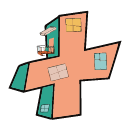Graduate Spotlight: Madelene Dailey
Madelene Dailey’s (A+A Co-Founder) research applies our values of community-driven design to rural and indigenous communities in Latin America.
Madelene graduated from USC with a Masters of Architecture degree this past May, and was awarded the Alpha Rho Chi School Medal of honor for outstanding leadership. At A+A, Maddee envisioned and led the first design-build at the USC chapter. In her design work, she advances equitable urban planning and sustainable design— thanks in part to her origins as an Urban Planner working as a consultant for the state of Florida.
In 2023, she traveled to her family’s hometown in rural Ipala, Guatemala to interview residents and conduct field work for what would become the foundation of her thesis. Her thesis focuses on developing inclusive planning efforts and flood-responsive design strategies for rural and indigenous agricultural settlements impacted by civil conflict and natural disasters.
After graduation, Madelene will continue this research through Habitat for Humanity’s International Humanitarian Shelter and Settlements research fellowship. She hopes to one day help Ipala create a Master Plan for its development that centers the needs of its rural residents— many of whom face reoccurring displacement. Read more about her research below.
Nueva Reforma: Supporting the Long-term Stability of Latin American Rural & Indigenous Communities affected by Civil War
Widespread displacement and the inadequate distribution of resources caused by civil wars, social strife, and climate change are ongoing threats to the livelihoods of Latin American communities. Roughly half of Guatemala’s current population lives in poverty and requires humanitarian aid, with numbers projected to increase by the end of 2024. Humanitarian efforts and research in response to this crisis are underway, but funding is limited and aid is often unable to reach the areas that need it most. Merging culturally thoughtful practices with interdisciplinary approaches to sustainable rural planning, this project aims to investigate how architecture can be leveraged as a tool to support inclusive rural development frameworks that allow impacted communities to self-navigate crisis response efforts and achieve long-term stability.











